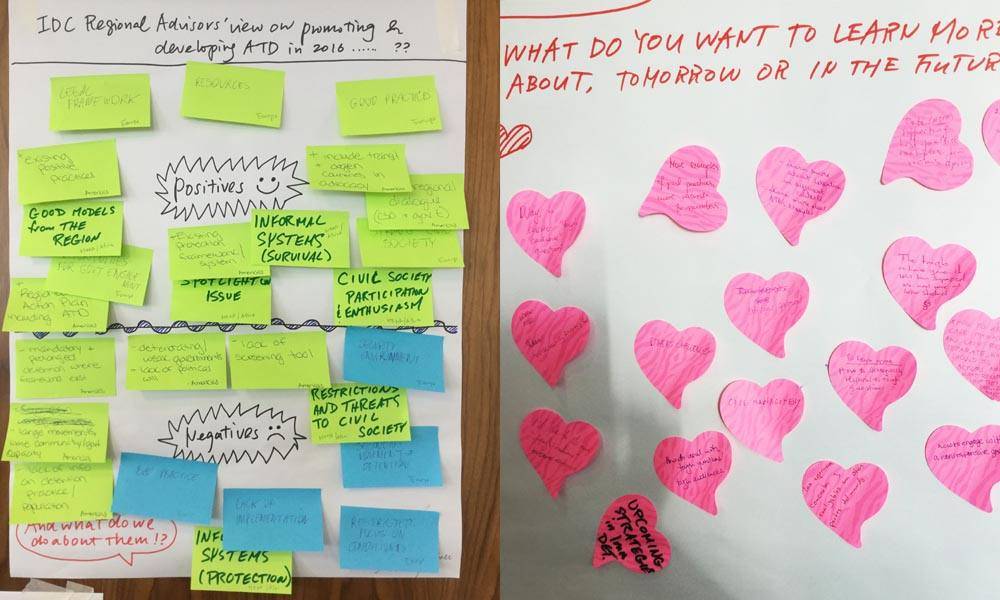UN Experts Seek Submissions on the Human Rights of Migrant Children
This is reposted from OHCHR, please find the original post here
CMW-CRC Joint General Comment on the Human Rights of Children in the Context of International Migration
The Committee on the Protection of the Rights of All Migrant Workers and Members of Their Families (CMW) and the Committee on the Rights of the Child (CRC) have started to elaborate a Joint General Comment (JGC) on the human rights of children in the context of international migration.
The joint general comment will seek to provide guidance to States parties to both Conventions on the situation of children in the context of international migration, including:
- Children that migrate with their parents who are migrant workers;
- Children that are born to parents who are migrant workers in transit and destination countries;
- Migrant children that return to their country of origin, either voluntarily or by force, alone or with their parents;
- Children left behind by their parents (or one of them) who have migrated to another country; and
- Children that migrate unaccompanied and separated from their parents (for reasons such as seeking employment, family reunification or as victims of trafficking, labour exploitation and child labour).
Following a call for submissions and the establishment of a zero draft, the Committees have decided to hold consultations to ensure that the perspectives of States, United Nations agencies and entities, civil society organizations and other stakeholders with respect to this issue are raised, discussed and reflected in the draft for further consideration by both Committees.
Documentation:
Expert and Regional Consultations:
Geneva Consultation (2 May 2017)
Madrid (4 to 5 May 2017)
Bangkok (24 to 25 May 2017)
- Concept Note Bangkok
- Background Note on Regional Conference on Children on the Move in Southeast Asia.
Berlin (12 to 13 June 2017)
Mexico City (28 to 29 June 2017)
If you are interested in contributing to this Joint General Comment on the Human Rights of Children in the Context of International Migration and would like further information, please contact IDC Advocacy Coordinator Ben Lewis at [email protected].
Save the Date : IDC Annual Member Meeting June 16

Members at the IDC Annual Member Meeting 2016
Our annual member meeting will be held at the International Conference Centre in Geneva on June 16 from 4.30 - 6.30 pm.
The meeting provides an excellent opportunity for members to share information and insight across the network. We will discuss four thematic areas which will help shape the work of the IDC in the year ahead.
This years meeting will be in the same building - and directly after - the annual UNHCR NGO Consultations.
All Members of the IDC are encouraged to fill out the short survey, available at the button below, by June 1 to inform the planing session.
Responses from the survey will be shared among IDC Members.
For those members who are unable to attend in person, a livestream of the member meeting will be available.
For more details, please contact [email protected]
How to Get Involved In the UN Global Study on Children Deprived of Liberty
Around the world, an unknown number of children are deprived of their liberty every year. Such detention often occurs in squalid conditions, without adequate oversight and regulation, negatively impacting children’s mental and physical development. Despite evidence that deprivation of liberty is both costly and harmful, there is an acute lack of comprehensive, disaggregated data and qualitative research on child detention, leaving States without a clear indication of the scope of the problem or adequate information on alternatives to detention that may be more beneficial to both children and society.
What is the UN Global Study?
The UN Global Study on children deprived of liberty (“Global Study”) will collect sorely needed qualitative and quantitative data on children in detention, while also studying good practices that can shape more effective policies and practices. Previous in-depth UN studies of this caliber have proved crucial in providing an objective reference point for serious issues such as children affected by armed conflict (Machel Study, 1996) and violence against children (Pinheiro Study, 2006).
The Global Study will take into account deprivation of liberty in all its forms, including: children in conflict with the law, children confined due to physical or mental health or drug use, children living in detention with their parents, immigration detention, and children detained for their protection or for national security reasons such as during armed conflict. It will take a collaborative approach with the involvement of a range of actors, including UN agencies, States, civil society organizations, academics, and children.
Support for the UN Global Study?
In December 2014, during the 69th Session of the UN General Assembly, UN member States adopted resolution A/Res/69/167:
“To invite the Secretary-General to commission an in-depth global study on children deprived of liberty, funded through voluntary contributions and conducted in close cooperation with relevant United Nations agencies and offices . . . and in consultation with relevant stakeholders, including Member States, civil society, academia and children, and to include good practices and recommendations for action to effectively realize all relevant rights of the child . . .”
The key output of the Global Study will be an in-depth, comprehensive global report to be presented to the UN General Assembly (UNGA) at its 73rd regular session (2018).
In October 2016, the UN Secretary General appointed Manfred Nowak as Independent Expert to lead the Global Study. Mr. Nowak is a professor of international law and human rights at the University of Vienna and the Secretary-General of the European Inter-University Centre for Human Rights and Democratisation in Venice. He was previously the United Nations Special Rapporteur on Torture and a member of the United Nations Working Group on Enforced or Involuntary Disappearances.
Get Involved
There are now over 100 non-governmental organizations from around the world who support the Global Study as members of the NGO Panel. The IDC Secretariat is a member of the NGO Panel, and encourages our Members to also join the NGO Panel to lend your support to the Global Study.
The IDC is also holding a free webinar to inform our Members and partners further about the Global Study and to discuss how to best support the Independent Expert on the collection of data and good practices around ending the immigration detention of children.
UNHCR Issue Brief clarifies position on ending child immigration detention
The IDC welcomes this update on UNHCR’s position on the detention of children in the context of immigration. As a global leader in ending the immigration detention of children and families, and in promoting alternatives to immigration detention, UNHCR has long played an important role in clarifying State obligations vis-à-vis asylum seeking and refugee children, and has been a close strategic and operational partner to the IDC.
This new Issue Brief, published in January 2017, builds upon the legal guidance provided by UNHCR’s 2012 Detention Guidelines (para. 51), and clarifies that children should never be detained for immigration related purposes, irrespective of their legal/migratory status or that of their parents, and that detention is never in their best interests. The Information Note further confirms that, in all cases, appropriate care arrangements and community-based alternatives need to be in place to ensure adequate reception of children and their families.
The rationale behind this clarification lies in the need to pair the policy in the 2012 Detention Guidelines with the evolution of the position of the UN Human Rights Mechanisms over the past few years, supported by a strong advocacy position from civil society organisations, in relation to the non-application of Art. 37(b) of the UN Convention on the Rights of the Child (CRC) to the detention of children in the context of immigration and border controls.
The Issue Brief also re-confirms public statements made by both the former and current High Commissioners for Refugees. In 2014, at the 25th Anniversary commemoration of the Convention on the Rights of the Child, then High Commissioner and current United Nations Secretary General, Mr. António Guterres, stated “the practice of putting children in immigration detention is in violation of the CRC in many respects and it should be stopped”. Similarly, at the ninth annual High Commissioner’s Dialogue on Protection Challenges in 2016, the current High Commissioner for Refugees, Filippo Grandi, when addressing how to better protect children on the move, stated:
“Children on the move are first and foremost children, and should be treated as such. They need love, care and schooling. They should be able to express their views freely and be listened to. Detention centres are no place for a child – immigration detention of children must stop.”
The Issue Brief is now available on Refworld and on UNHCR’s Detention page:
- UN High Commissioner for Refugees (UNHCR), UNHCR's position regarding thedetention of refugee and migrant children in the migration context, January 2017, available at: http://www.refworld.org/docid/5885c2434.html
- UNHCR’s Global Strategy - BeyondDetention: http://www.unhcr.org/detention.html
To learn more about this new UNHCR Issue Brief, please contact Ariel Riva, Legal Officer, Protection Policy and Legal Advice, Division of International Protection ([email protected]).
Libyan Civil Society & Government Discuss Alternatives to Immigration Detention

TUNISIA, Tunis —Libyan civil society and government representatives, together with members of the international community discussed on December 15 and 16 the implementation of alternatives, during the latest in a series of workshops aimed at reducing harmful immigration detention.
“The commitment of the government and civil society partners to work together to engage migrants and ensure their basic needs are met is inspiring,” Danish Refugee Council Country Director Martin Vane
According to the UN Support Mission in Libya (UNSMIL) there are currently between 4,000 to 7,000 migrants being held in 24 centres spread throughout the country, many of them facing difficult conditions and a stay of indefinite length.
In response to this growing challenge, representatives of Libyan civil society presented a draft law, advocating for alternatives to immigration detention and providing a legal framework for migrants in the country. Members of the Libyan Government DCIM highlighted a new pilot project for registration of migrants that has been coordinated with the local municipal council. A representative of the Ministry of Justice noted that legislation was also required to help regulate centres.
“The commitment of the government and civil society partners to work together to engage migrants and ensure their basic needs are met is inspiring,” Danish Refugee Council Country Director Martin Vane said in the opening remarks.
Mr. Vane commended the effort being made “over these two days to develop a pilot for alternatives to detention, including a focus on vulnerable women and children.”

Organised by DRC, The Alternatives to Detention II two-day workshop was an interagency effort, facilitated by the International Detention Coalition (IDC), and held under the auspices of the newly launched Mixed Migration Working group, co-chaired by IOM and UNHCR. Read the workshop report here.
The participants agreed to work together on practical solutions to harmful detention, including training front line case managers, formalising referral pathways and increasing support to safe community housing options outside detention.
Ms Junita Calder, IDC Regional Coordinator for the Middle East and Africa said “Both Libyan government and civil society have firsthand understanding of the nuances of the local context therefore the alternative to detention pilots they have proposed together have a high likelihood of success.
“We stand together with the Mixed-Migration Working Group, willing to offer technical support for pilot development and implementation.”
The workshop and the practical suggestions are in line with the recent UNHCR dialogue that highlighted an urgent need to end immigration detention of children.
In the recent New York Declaration for refugees and migrants, all 167 UN Member States committed to work together to End Child Detention.
The workshop comes at a critical time as the Global Compact on Refugees and the Global Compact for Safe, Orderly and Regular Migration are currently under development by UN Member States.
During the workshop, Libyan civil society organisations called on all partners to help in this collective effort to show that there can be alternatives to immigration detention in Libya.
“While the overall security situation in Libya still causes serious concern, all of the involved actors shall strive to ensure that suitable alternatives to detention for most vulnerable groups such as women, girls, unaccompanied minors will be found,”Mr. Vane added.
“These could be done for example through placement into migrant or Libyan communities if feasible and such processes can be supported by Libyan civil society organizations working on mixed migration issues and by the international donor community.”
The workshop, funded by the European Commission’s Humanitarian Aid and Civil Protection department (ECHO) was also attended by representatives of UN agencies including UNSMIL, IOM, UNHCR and INGOs, with facilitation from the International Detention Coalition (IDC).
Did You Know? Alternative to Detention Facts from MENA
These are just some of the examples of alternatives to detention - ie any law, policy or practice by which enables people to live in the community across the Middle East North Africa Region (MENA), without being detained for migration-related reasons.
--
A fashion start up is providing productive, dignified work for women living as refugees in Jordan? What a great alternative to pointlessly detaining women who can now contribute to the economy while building their own skills. Read more here.
Image published by the Guadian. Asma Aradeh, employed by social enterprise SEP Jordan inspects embroidery work together with two colleagues. Photograph: Faras Oran
The Khartoum Process, established in 2014 aims to reduce the arrival of trafficked migrants to Europe’s southern borders through enhanced border security, upgraded national legislation and disrupting or dismantling migrant smuggling and human trafficking networks in Djibouti, Egypt, Eritrea, Ethiopia, Kenya, Sudan, South Sudan and Tunisia. Read more:
- Betts, A. and Milner, J., The Externalisation of EU Asylum Policy: The Position of African States. Oxford: Centre on Migration Policy and Society (2006) pp 3-4; Reitano, T., Adal, L.
- Shaw, M., ‘Smuggled Futures: The Dangerous Path of the Migrant from Africa to Europe’
Under the Moroccan Migration Act (2003), a court order is required for the detention of foreign nationals beyond 24 hours, this can be extended for up to fifteen days, plus ten additional days (Art. 35). These kind of time limits on the use of detention set up a presumption of liberty for all migrants in Morocco which compliments the Constitutional safeguards against arbitrary detention and guaranteeing the right to information about grounds for detention, legal assistance and communication with relatives (Art. 23 Moroccan Constitution 2011).
In September 2014, the Ministry of Labour announced that [recognised] refugees in Algeria could apply for a residency permit (certificat de travail) as well as an ‘authorisation to work.’ Another great example of alternatives being used in order for refugees to be able to meet their own basic needs. Read more in: Flux migratoires “des africains” en Algérie: Alger partagé entre enjeux sécuritaires et impératifs humanitaires, September 16th, 2014.
Alternatives are up to 80% less expensive than immigration detention (IDC, 2015)
Agreements made by the Egyptian government, allow Syrian and Sudanese nationals to access to medical care at the same price as Egyptian citizens. Read more in IOM’s “Migration in Egypt, Morocco and Tunisia - Overview of the complex migratory flows in the region”.
Freedom to move and support our families
Do you know about alternatives to detention in North Africa?
The IDC is proud to announce that our exciting new study on North Africa, in collaboration with MHub and the North Africa Mixed Migration Task Force (NAMMTF), has commenced.
This research study aims to identify, describe and assesses alternatives to immigration detention in North Africa, with a strong focus on children and youth. The research will focus on the countries of Algeria, Egypt, Libya, Morocco, Sudan, and Tunisia. IDC recently appointed Mr Abdelkader Abderrahmane as the lead research consultant to implement the program of research.
Since 2011, violent conflicts in places like Libya and Syria has displaced millions of individuals in the Middle East and North Africa region. In recent years, asylum seekers and other migrants have increasingly used the North African coastline as a route to Europe. Some of these migrants are vulnerable children and youth who embark on the perilous sea journey without their parents. Further, the EU is pressuring North African governments to curb migration flows from their countries with over 4,000 deaths in the Mediterranean in the first half of 2016 alone. In light of these developments, governments in North Africa are increasingly using immigration detention.
The IDC has published research on alternatives to detention after surveying over 50 countries around the world, identifying over 250 efficient, humane and viable options for migration governance. The approaches include community options to prevent detention of children. This new North Africa study will identify alternatives for policy makers, civil society and international agencies in the region.
MHub is an initiative developed by humanitarian agencies in North Africa including the Danish Refugee Council, Regional Mixed Migration Secretariat and the UNHCR. MHub produces research and analysis on mixed migration trends and developments, for NAMMTF members and relevant stakeholders in the region.
To aid us with this study, if you are aware of any alternatives to immigration detention in the North Africa region, please contact IDC Senior Advisor and Research Coordinator Dr. Robyn Sampson on [email protected] or IDC MENA Regional Coordinator Ms. Junita Calder on [email protected]
Expansion of Alternatives to Detention in MENA Urgently Required
Congratulations Yusra Mardini on winning your women’s 100 meters swimming heat at this year’s Olympics! We are very glad to follow such exciting coverage of the first ever Refugee Olympic Team participating in the Rio Olympic Games. Although it is sad to note that media attention has largely moved on from the stories of those people who continue to make the dangerous crossing between MENA and Europe by boat, which Mardini and her sister remember only too well. Just over a year ago, they were in the frigid waters of the Aegean Sea using their swimming abilities to save the lives of others on the broken down boat they had been travelling on. Tragically, she has not been joined on the historic team this year by 2008 Beijing Olympian Samia Omar, who after running the 200 meters as a representative of Somalia, later had to stop training: first because the extremist group Al Shabaab banned sports in her home country; then later due to her flight from persecution and confinement in a refugee camp. Tragically, Omar lost not only her chance to compete but also her life, whilst seeking safety and the opportunity to participate in the London Olympics of 2012, by crossing the Mediterranean Sea irregularly. How many more hopes, dreams and talents will be wasted before changes take place, which will end such senseless loss of life?
As effectively highlighted in this opinion piece by IDC MENA Regional Advisor, Dr Melissa Phillips, the dangerous and exploitative conditions which drive many refugees and migrants to and through the MENA region still exist and are in some cases worsening. Many people are forced to seek irregular pathways to move on to Europe because too few legal avenues to asylum or work rights exist. These push factors, including unnecessary immigration detention, are unfortunately stagnating as a result of EU policy, rather than being solved through exploration of innovative alternatives to detention. As Dr Phillips says, perhaps:
“…[If] schemes for temporary labour migration were piloted, migrants and refugees would have viable alternatives to risky and unsafe irregular migration by boat…”
As the IDC we believe in exploring and promoting viable alternatives to immigration detention and partnering with local civil society, international agencies and governments to expand their use. As such, if you have any information to contribute to our current research project about refugee and migrant community support programmes in North Africa, please contact Junita Calder, MENA and Africa Regional Coordinator of the IDC via email [email protected]
IDC ATD Workshop for Regional Advisors - June 2016 London, UK
On 19 and 20 June 2016, the IDC ran its first ever alternatives to detention workshop designed specifically for our Regional Advisors. The workshop was attended by 17 participants from MENA, Africa, Europe and the Americas and delivered by three IDC staff.
This participatory workshop was designed to increase IDC’s Regional Advisors ability to act as our alternatives to detention influencers, at national, sub-regional and regional level, using IDC’s report There Are Alternatives and the Community, Assessment and Placement (CAP) Model as a tool for change.
Over two days, the participants practiced delivering the CAP model presentation and led series of discussions to explore challenges and tactics in advocating for and developing alternatives to detention. We also carried out SWOT (Strength, Weakness, Opportunity and Threat) analysis of each region, to identify positive and negative factors surrounding advocacy to promote alternatives to detention.
Inter-regional comparison was fruitful and stimulating; there were clearly some regional differences but also some similarities. As each region is externalizing its migration control, we also acknowledged increased need to consider inter-regional approach. External speakers from UK members shared their experiences of involving people who were in detention in their advocacy and campaigns, use of social media to communicate immigration detention widely as well as practical experience of case management in a community-based alternative to detention pilot project.
A range of topics discussed demonstrated a complex reality that our Regional Advisors need to contend with, when advocating for alternatives to detention. While there was no single answer to any of these questions, it made clear that each of us is required to use our own analysis to come up with an adequate response, while referring back to the CAP Model. Summary papers for these discussions prepared in advance by the participants will act as resources for IDC, as we continue to examine how best we can collectively advocate for alternatives to detention.
The following topics were discussed during the workshop:
- How useful are arguments for alternatives when faced with mass arrivals?
- Is regional level advocacy and lobbying useful? How do you work with institutions?
- Is the cost argument useful?
- Is strategic litigation / law a useful tool to promote alternatives to detention? Where does case management fit into legal framework?
- Pros and cons of advocating for alternatives for a particularly vulnerable group
- “Transit” and alternatives
- How do you set a strategy for change?
One of the highlights of the workshop was a “CAP Model multilingual relay”, in which each participant delivered one to two slides of the presentation in the language of their choice. Between us, we managed to cover 11 languages; showing the power of network-based advocacy as we can potentially translate the concept of the CAP into a national context but also highlighting challenges of adapting a global tool into a locally meaningful concept; many of us struggled to find the right words to describe various terminology. How are we to describe “assessment and screening”. “minimum standards” and “case management”, when they do not exist as concepts yet?
After two exhausting days, we completed our workshop by agreeing our practical action points, based on our learning from and thinking at the workshop. At the least, each Regional Advisor will be delivering the CAP model on national or regional platform over the next 12 months, and we will be reporting their progress in our newsletter - the International Detention Monitor.
We would like to thank the Open Society Foundation in London for generously offering the workshop venue.




